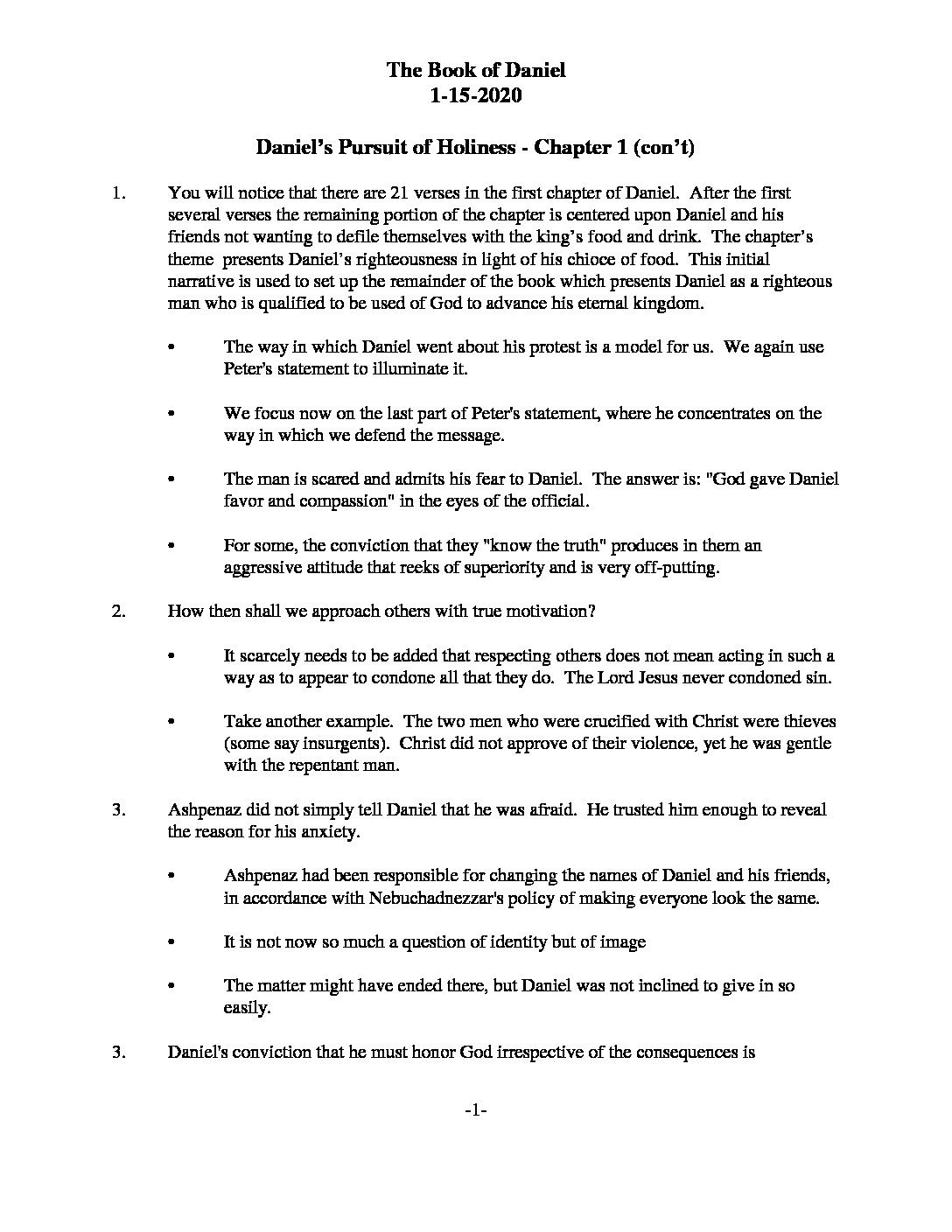The Book of Daniel #4 – Daniel’s Pursuit of Holiness (continued)
The Book of Daniel
1-15-2020
Daniel’s Pursuit of Holiness – Chapter 1 continued
Daniel 1.15.2020.student notes
1.You will notice that there are 21 verses in the first chapter of Daniel. After the first several verses the remaining portion of the chapter is centered upon Daniel and his friends not wanting to defile themselves with the king’s food and drink. The chapter’s theme presents Daniel’s righteousness in light of his choice of food. This initial narrative is used to set up the remainder of the book which presents Daniel as a righteous man who is qualified to be used of God to advance his eternal kingdom.
- The way in which Daniel went about his protest is a model for us. We again use Peter’s statement to illuminate it.
- We focus now on the last part of Peter’s statement, where he concentrates on the way in which we defend the message.
- The man is scared and admits his fear to Daniel. The answer is: “God gave Daniel favor and compassion” in the eyes of the official.
- For some, the conviction that they “know the truth” produces in them an aggressive attitude that reeks of superiority and is very off-putting.
2. How then shall we approach others with true motivation?
- It scarcely needs to be added that respecting others does not mean acting in such a way as to appear to condone all that they do. The Lord Jesus never condoned sin.
- Take another example. The two men who were crucified with Christ were thieves (some say insurgents). Christ did not approve of their violence, yet he was gentle
with the repentant man.
3. Ashpenaz did not simply tell Daniel that he was afraid. He trusted him enough to reveal the reason for his anxiety.
- Ashpenaz had been responsible for changing the names of Daniel and his friends, in accordance with Nebuchadnezzar’s policy of making everyone look the same.
- It is not now so much a question of identity but of image
- The matter might have ended there, but Daniel was not inclined to give in so easily.
3. Daniel’s conviction that he must honor God irrespective of the consequences is impressive, but so also is the sensitive way in which he went about his protest.
- • There is a simple but important lesson here for us. Daniel took time.
- How good will we look? Isn’t that one of the pressures that can affect our willingness to stand up for our faith and be counted?
- It is, therefore, increasingly difficult to avoid the marginalization that results from stepping out of the politically correct line.
- We read that God honored them, and not only in their improved physical appearance: “he gave them learning and skill in all wisdom and literature.”
- When Nebuchadnezzar personally examined them at the end of the three-year intensive training, Ashpenaz must have been proud to see that his charges were at the very top of the class.
4. It would be a mistake, however, to think that this story somehow guarantees that if we honor God with our witness he will make us into intellectual and administrative geniuses
like Daniel and his friends
- He had a very special role for them to fulfill, and he also has one for us.
- We must learn to be content with the significance that God gives us, like Abraham did; and contentment comes when we understand that it has pleased God to make us just as we are.
5. The first stage of Daniel’s account is now complete. He and his friends have set their compass bearing on God. The rest of the book will tell us how that initial resolve developed into the established habit of a lifetime.

